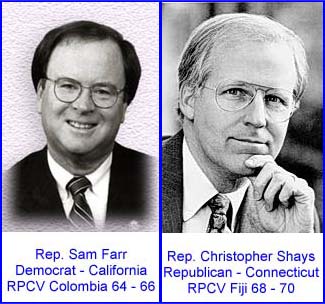
RPCV Congressmen Sam Farr and Christopher Shays team up to introduce the Clean Cruise Ship Act of 2004
Legislators Promote Better Ocean Stewardship with Introduction of Clean Cruise Ship Act of 2004
From The Ocean Conservancy
Thursday, April 1, 2004
Legislators Promote Better Ocean Stewardship with Introduction of Clean Cruise Ship Act of 2004
Members of Congress act to protect marine ecosystems from cruise ship pollution
Washington, DC - The Ocean Conservancy applauds the bi-partisan group of legislators led by Senator Richard J. Durbin (D-IL), California Congressman Sam Farr (D-17th), and Connecticut Congressman Christopher Shays (R-4th) for introducing the Clean Cruise Ship Act of 2004. As cruise ships have continued to grow in popularity, capacity and number, so has their impact on our ocean ecosystems. This new measure will establish clear and reasonable environmental standards for a largely unregulated industry.
The cruise ships of today carry thousands of passengers, and produce waste equivalent to that of small cities. Yet they are not governed by the same anti-pollution laws as municipalities of comparable size on land. Right now, cruise ships are not subject to regulations that would help protect the beautiful and inspiring ocean ecosystems and marine wildlife that attract many cruise ship travelers.
"Cruise ships have largely escaped pollution regulations, and The Ocean Conservancy believes it is time to adopt legislation that brings cruise ships in line with 21st century pollution control practices," said Roger Rufe, President of The Ocean Conservancy. "With the large expansion in the cruise industry, the Clean Cruise Ship Act of 2004 provides an appropriate solution to a preventable problem."
Cruise ship impacts have increased tremendously with the industry's powerful growth. In 2002 more than 8.6 million passengers boarded cruise ships. The industry has grown by an average of 10 percent annually and is expected to bring more than 49 new vessels into service by 2005.
"As cruise ships continue to grow in size and numbers, they are leaving 30 year-old ocean pollution regulations in their wake," said Senator Richard J. Durbin. "The cruise ship industry must accept greater responsibility in preventing irreparable damage to the very marine resources on which the industry thrives."
The Clean Cruise Ship Act of 2004 would ban discharges of sewage, graywater and bilge water within coastal areas, and require treatment of these waste streams in all other U.S. ocean waters. Over the past few years, a number of coastal states have moved to adopt their own regulations regarding cruise ships in response to growing pollution problems associated with the industry.
This federal legislation will establish uniform regulation in all U.S. waters. Some of the pollutants generated daily by these giant ships include as much as 37,000 gallons of oily bilge water, 30,000 gallons of sewage, and 255,000 gallons of graywater from showers, laundries and kitchens.
To access a copy of the Clean Cruise Ship Act of 2004, and download a copy of The Ocean Conservancy's Cruise Control report, visit our website at www.oceanconservancy.org
